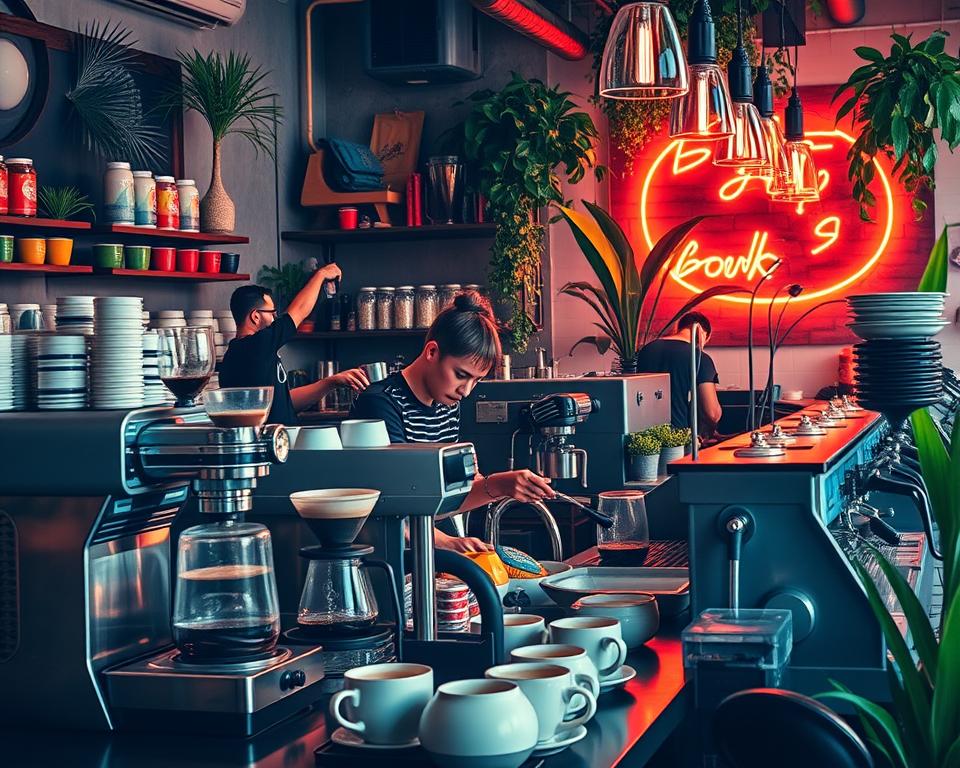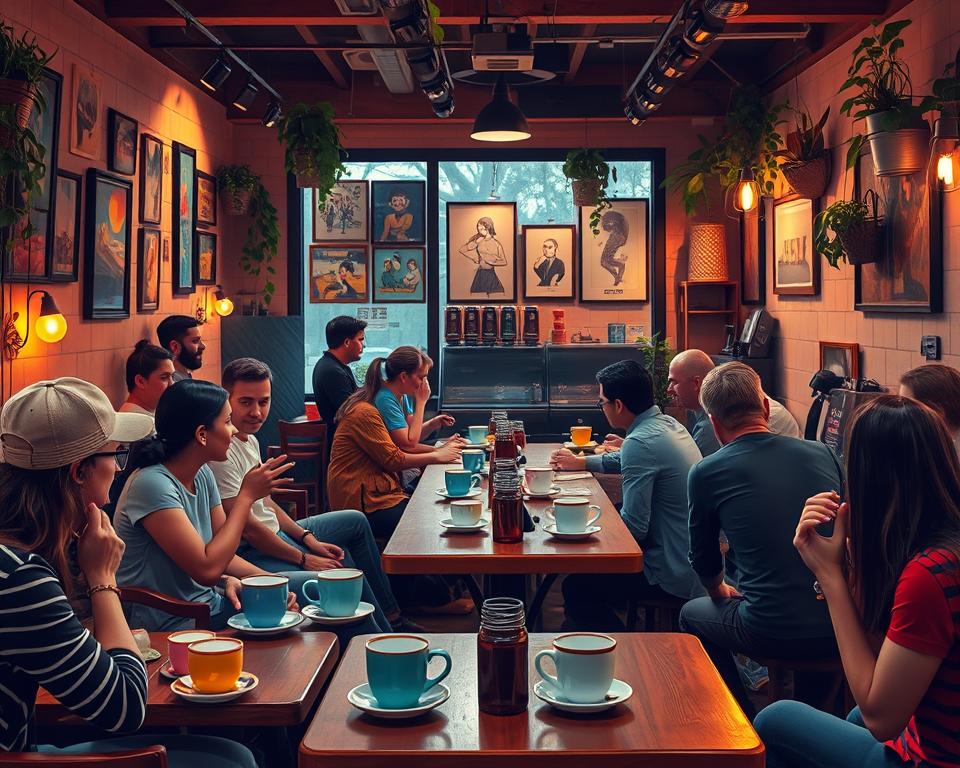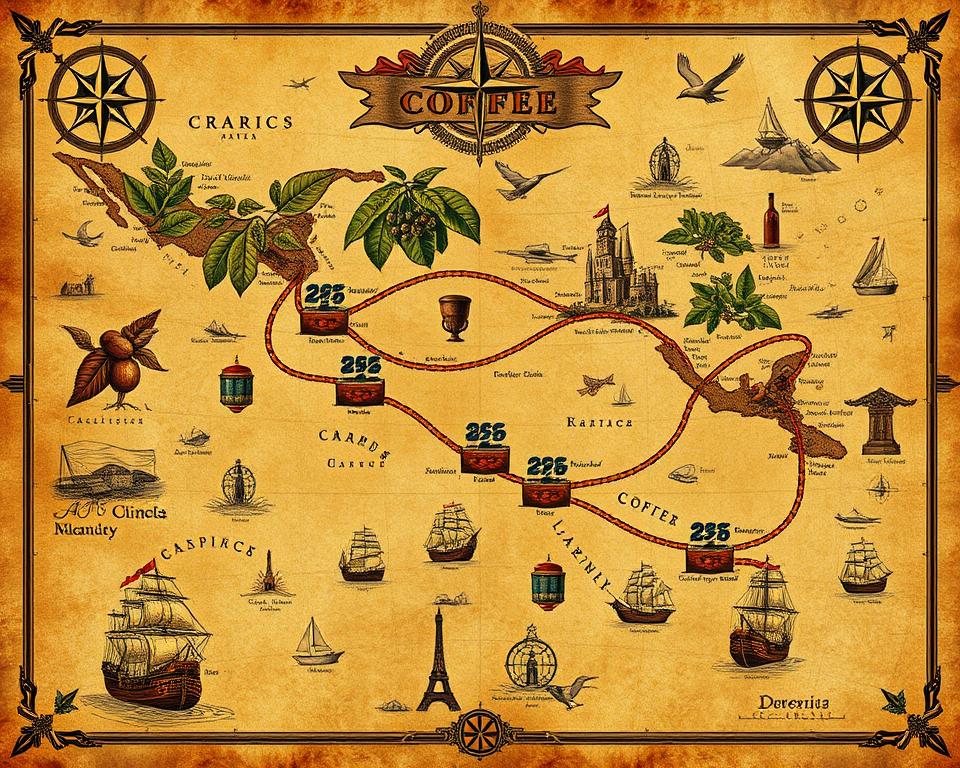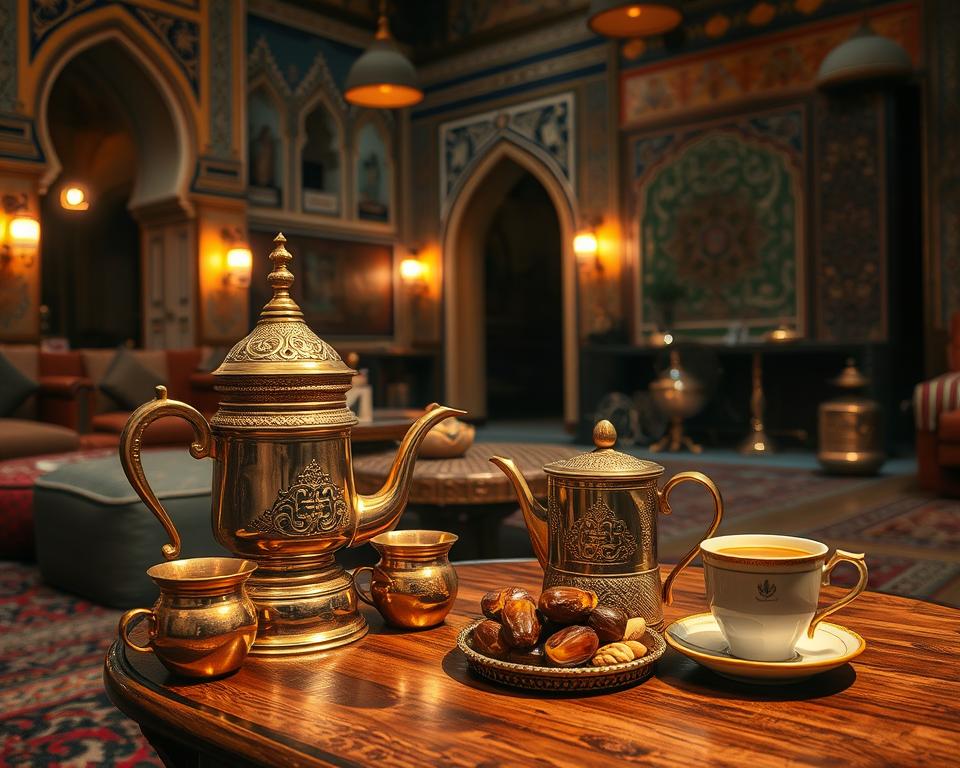The specialty coffee movement is captivating the world. No longer are we fine with just any coffee. Now, people search for a gourmet coffee experience. It’s all about top-quality beans, careful roasting, and precise brewing, says the Specialty Coffee Association (SCA).
Coffee lovers are leading this trend, seeking out unique flavors and better quality. To be considered specialty, coffee should score 80 or more out of 100. This is changing the coffee game. Over the last ten years, the number of specialty coffee shops has increased worldwide.
The journey from bean to cup is seen as an art. Cities like Melbourne, Tokyo, Portland, and Copenhagen are at the forefront. They focus on quality, sustainability, and community in their coffee cultures.
This trend in artisanal coffee is doing more than just changing our drinks. It’s sparking new technology in brewing equipment and new ideas for coffee shops. The specialty coffee world is embracing eco-friendly and sustainable ways. This ensures our coffee not only tastes great but also does good.
The Evolution of Coffee Culture
The rise of coffee culture has turned it from just a morning drink to a key part of society. Now, coffee means more than waking up; it’s vital for many daily activities. People love specialty coffee for its varied, rich tastes and the cozy places it’s enjoyed in. These spots are perfect for hanging out or having meetings. Let’s see how coffee became so embedded in our culture.
Coffee: More than Just a Beverage
In different cultures, coffee has its own special touch. Turkey makes it into a fine powder for a strong brew. Italy’s fast-paced life gave us the quick, strong espresso shot. Coffee also shines in dishes like tiramisu from Italy and mole from Mexico. Coffee places have become key social spots, offering much more than coffee.
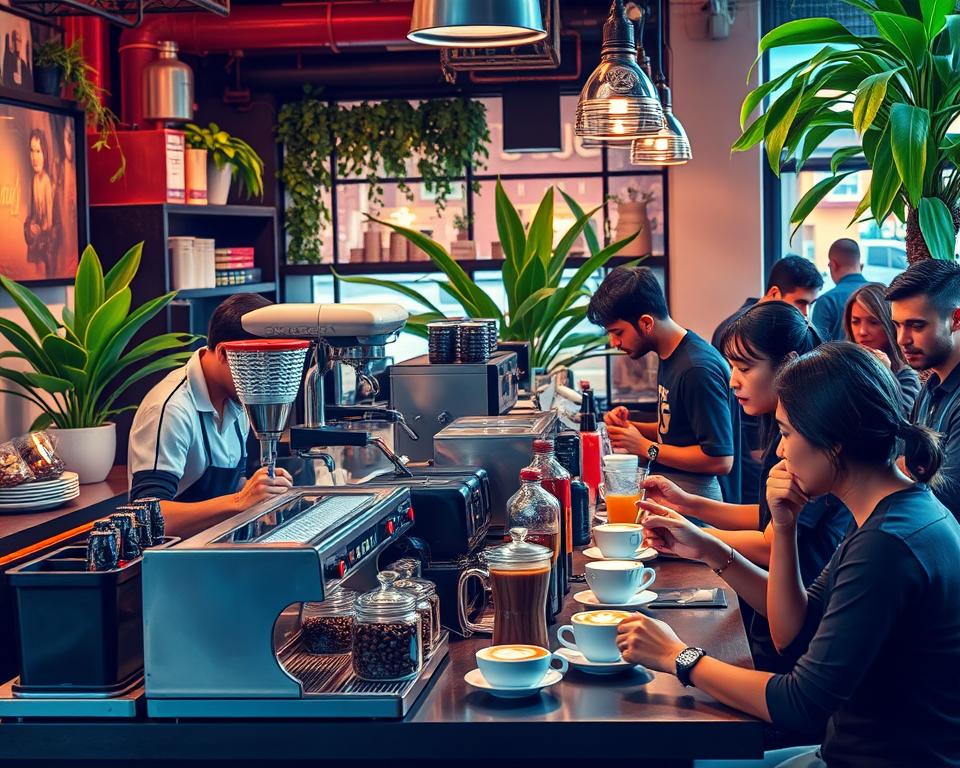
The Birth of Coffee Culture in the 21st Century
The 21st century boosted coffee culture with gourmet coffee and new coffee spots. Specialty cafes and quality beans help celebrate coffee’s rich flavors. For example, South Korea’s coffee shops are all about look and feel. Everywhere, from Starbucks to local cafes, shows coffee’s role in bringing people together.
Global Influence of Coffee Enthusiasts
Coffee lovers have made its culture go global. They share their passion online, making it well-known worldwide. Key coffee-producing countries include Brazil, Colombia, and Vietnam. Companies like Starbucks, with over 32,000 stores, show how big coffee’s impact is globally.
The Art of Coffee Roasting
Roasting coffee beans is key to their final flavor. Enjoying a light roast with fruity notes or a dark roast with hints of chocolate and caramel? It’s the roasting process that releases these rich flavors that coffee lovers adore.
The Science of Roasting
Roasting coffee is both an art and a science. It needs exact temperature, close monitoring, and perfect timing. To create the best-flavored coffee, roasters must understand the science behind roasting. This includes knowing the chemical changes that happen. The best flavor comes from roasting at 221 to 223°C for 14 to 27 minutes.
Roast Levels and Their Flavor Profiles
Coffee roasting levels offer a wide range of tastes. Light roasts keep more chlorogenic acids, making coffee bright, acidic, with fruity notes. Dark roasts, made at about 230°C for 10 minutes, have bold flavors like chocolate and caramel. This means you can find a coffee that’s just right for you.
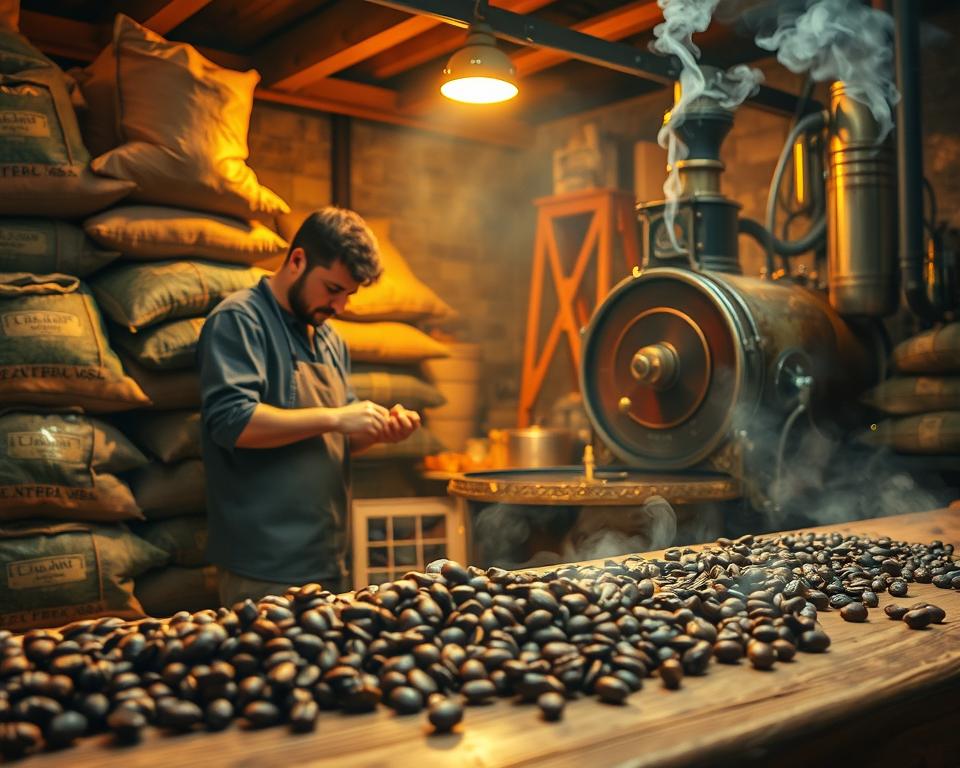
Emerging Trends in Coffee Roasting
Lately, the craft of coffee roasting has seen new tricks such as cold brew and barrel aging. These methods bring fresh tastes and meet the demand for unique coffee. Roasters like Heart Coffee Roasters and Little Wolf Coffee are leading with these innovative flavors.
Specialty coffee is now a big deal in the industry. With these changes, coffee roasting is getting even more exciting. We’re looking forward to future trends in our daily cup.
The Role of Coffee Shops in the Rise of Specialty Coffee
Coffee shops are key in the specialty coffee wave. They are more than just spots to grab a coffee; they are community centers. These places drive community ties and spark innovation. The impact of coffee shops on culture is massive.
Creating Community Spaces
Coffee shops help create places where people meet, work together, and make new things. Their unique vibe makes them different from big chains. They help the local economy and create jobs. They also host events like book clubs and live music, making communities stronger.
Hub for Innovation and Creativity
Coffee places are where social life and new ideas meet. They are a birthplace for creativity. Baristas and shop owners try new brews and eco-friendly practices. Coffee shops are magnets for thinkers and doers, thanks to their innovative spirit.
Cultural Events and Social Gatherings
Coffee shops play a huge part in cultural and social events. They host readings and community talks. They care about quality and know their regulars by name. This builds loyalty. By focusing on top-notch coffee, they show quality matters more than quantity.
Specialty Coffee: Methods and Techniques
Specialty coffee is all about unique methods and flavors. There are many brewing techniques, like pour-over and cold brew. Each one brings out different tastes from the beans. This turns every cup into a special experience.
Popular Brewing Methods
Enthusiasts enjoy trying different ways to brew their coffee to get the taste they love. Some favorite methods are:
- Pour-over – Great for those who want control to bring out subtle flavors.
- Espresso – Delivers a dense shot for a bold coffee kick.
- Cold Brew – Smooth and deep, made by steeping it for 24 hours.
- Aeropress – Quick and adjustable, perfect for trying different brewing styles.
Preference and Taste Profiles
The taste of coffee can change a lot depending on where it’s from and how it’s made. For example, African coffees can be fruity and are great for pour-overs. Latin American coffees might taste like chocolate, which is perfect for espresso. Methods like pour-over and cold brew highlight these distinct flavors.
Home Baristas and Their Rituals
More people are making great coffee at home and loving it. It’s about enjoying both making the coffee and drinking it. They use good tools, like reliable drip machines and precise scales. This shows how much they value the taste and craft of coffee.
How Does Espresso Culture Contribute to the Modern Specialty Coffee Movement?
Espresso culture historical roots deeply influence the modern specialty coffee movement, offering a rich tapestry of flavor, craftsmanship, and community. This heritage is celebrated by roasters and baristas who embrace artisanal techniques, ensuring each cup reflects both tradition and innovation, ultimately enriching the coffee experience for enthusiasts worldwide.
Conclusion
The rise of specialty coffee shows our deep love for coffee culture. It champions craftsmanship, taste, and caring for our planet. Over the last ten years, we’ve seen more specialty coffee shops pop up worldwide. These shops follow the Specialty Coffee Association’s (SCA) high standards. They offer top-notch beans and brewing methods for coffee lovers.
Specialty coffee stands out for its ethical focus. It supports fair and direct trading with farmers. This ensures they get a good price for their coffee. It also helps our environment. Artisan roasters take great care to bring out the best in coffee beans. They are committed to excellence. Different brewing methods like espresso and French Press make drinking coffee a special experience.
This coffee movement has sparked new businesses. Many coffee shops now care about artisan brewing and green practices. They draw in people who care about society and love great coffee. Specialty coffee is loved worldwide, crossing ages and places. Whether it’s young folks or older generations, in the U.S. or Asia, this movement brings us together. Every cup connects us – from farmer to drinker, from old ways to new, and with each other around the world.
FAQ
What is specialty coffee?
Specialty coffee stands out because of its quality. The Specialty Coffee Association (SCA) defines it. It’s all about high-quality beans, the right way of roasting, and brewing with care. This approach brings out unique and exciting flavors, making the coffee experience top-notch.
How has the specialty coffee movement reshaped the coffee industry?
The specialty coffee movement has changed the industry a lot. It focuses on gourmet coffee, unique tastes, and enjoying coffee fully. This change has made people more aware of the quality and ethics behind coffee. Now, coffee is not just a drink. It’s a global cultural trend.
What are some emerging trends in coffee roasting?
New trends in coffee roasting are making waves. Cold brew, nitro brew, and barrel aging stand out. These methods offer new flavors and experiences. They’re changing how we think about coffee.
Why are coffee shops important in the specialty coffee movement?
Coffee shops are key to the specialty coffee movement. They’re more than places to drink coffee. They’re spots where people meet, share ideas, and work together. They help local economies by creating jobs and supporting fair trade. This makes communities stronger and happier.
What are some popular brewing methods for specialty coffee?
There are a few top brewing methods for specialty coffee. Pour-over, espresso, cold brew, and Aeropress are popular. Each method brings out different qualities in the beans. This lets us enjoy coffee’s natural flavors even more.
How does the coffee’s origin affect its flavor profile?
Where coffee comes from makes a big difference in its taste. African coffees might taste fruity and bright. On the other hand, Latin American coffees might have chocolatey and nutty flavors. The way we roast and brew these beans can enhance these unique tastes.
What impact does the specialty coffee movement have on local economies?
The specialty coffee movement is good for local economies. It creates jobs in artisanal coffee roasting, coffee shops, and supports fair trade. It also improves life for farmers and supports farming that’s good for our planet.
What makes a good home barista?
A good home barista loves coffee and is eager to learn how to brew it well. They might buy good coffee equipment and try different brewing methods. This helps them make amazing coffee at home and enjoy every sip.
How have social media platforms influenced coffee culture?
Social media has a big impact on coffee culture. It lets coffee lovers share their experiences, brewing tips, and coffee pictures. It also helps spread the word about special coffee shops and new coffee trends worldwide.

